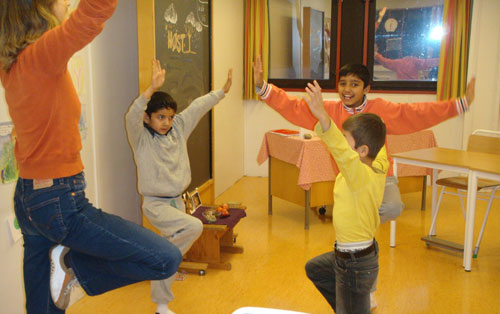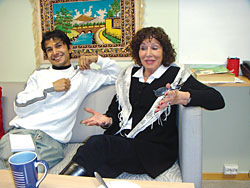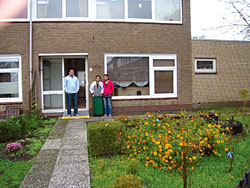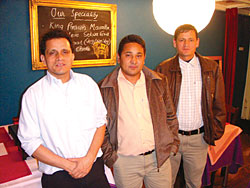 GOPAL GURAGAIN THE KIDS ARE ALRIGHT: Bhutani children in a Norwegian school. |
Refugees from Bhutan who had been living in camps in Nepal since 1991 are finding it difficult to adjust to life in Europe and separation from their extended families, but their children have fit right in. They are learning the local languages and making friends fast.
It is the older family members who bear the brunt of culture shock, and find their new environment difficult to get a handle on. But all agree that they are willing to go through it for the sake of their children.
"We came here for our son's sake, so he would have a future," says Kamala Rijal, who was resettled in Utrecht in the Netherlands last year with her husband Hem and son Manish. "He already speaks Dutch better than Nepali and all his friends are Dutch."
In Denmark, Durga and Balkumari Adhikari's two sons are already fluent in Danish and are so good with gadgets they are in high demand in their apartment to fix the neighbours' malfunctioning computers.
 FAST LEARNER: Ramesh Gautam with teacher Ina Jacobsen in Norway |
Bhutan evicted nearly 100,000 of its citizens 20 years ago, and with India's assistance dumped them in eastern Nepal. Their numbers in seven camps in Morang and Jhapa have grown to 110,000 and those born in the camps are now teenagers. Two years ago, a consortium of western countries agreed to resettle the refugees and over 20,000 have now left, mostly to the United States. So far, Norway has taken 310, Denmark 305 and the Netherlands 122 refugees.
After living for nearly two decades in bamboo huts in the hot and dusty plains of eastern Nepal, the Bhutanis now enjoy the amenities of modern apartments with high-tech kitchens. But it's not the novelty of life in Europe that the refugees are most happy about. They say it is the first time in a long time they are being treated with respect.
Naturally, there is the sorrow of separation from their extended families back in Bhutan and Nepal (Read Endless goodbyes). "We now have everything we want, the only worry is about the relatives we left behind," says Kebalram Rijal, 55, who arrived in Utrecht from Goldhap recently.
 HOME SWEET HOME: Nawaraj Gajmer and family in the Netherlands |
Third country resettlement has not always been able to place family members together. Kebalram starts his day in a prayer room filled with pictures of Hindu gods and goddesses and he prays that he will soon be reunited with his parents, who were resettled in America, and his daughter, who is still in Jhapa.
In the west Norwegian town of Tysuar Rohit Pokhrel, 68, and his wife are worried about their family as well, and say the only thing missing in their life is a Hindu priest to do saradhha and other ceremonies.
Ram, Laxman and Arjun
 |
Fed up with living in the camps, Ram Karki arrived in the Netherlands via the Czech Republic and Belgium seven years ago. He is an activist for refugee rights and is now a Dutch citizen. He has filed a case against the Bhutan king at the International Court of Justice in The Hague, Netherlands.
Ram's brothers Arjun and Laxman (pictured, to his right) have now joined him in the Netherlands under the third country resettlement scheme. But his eldest brother is a teacher in Bhutan and their parents are still in their ancestral village in southern Bhutan. Ram, Laxman and Arjun haven't met their parents and elder brother for nearly 20 years, and would like to have a family reunion more than anything else. As a Dutch national, Ram can now theoretically travel back to Bhutan but says he is afraid the Thimphu regime may harass his brother and parents because of his activism.
READ ALSO:
Endless goodbyes - FROM ISSUE #480 (11 DEC 2009 - 17 DEC 2009)
Can't wait to leave - FROM ISSUE #409 (18 JULY 2008 - 24 JULY 2008)
No place like home - FROM ISSUE #306 (14 JULY 2006 - 20 JULY 2006)
Home away from home - FROM ISSUE #340 (16 MARCH 2007 - 22 MARCH 2007)
Long way from home - FROM ISSUE #353 (15 JUNE 2007 - 21 JUNE 2007)


